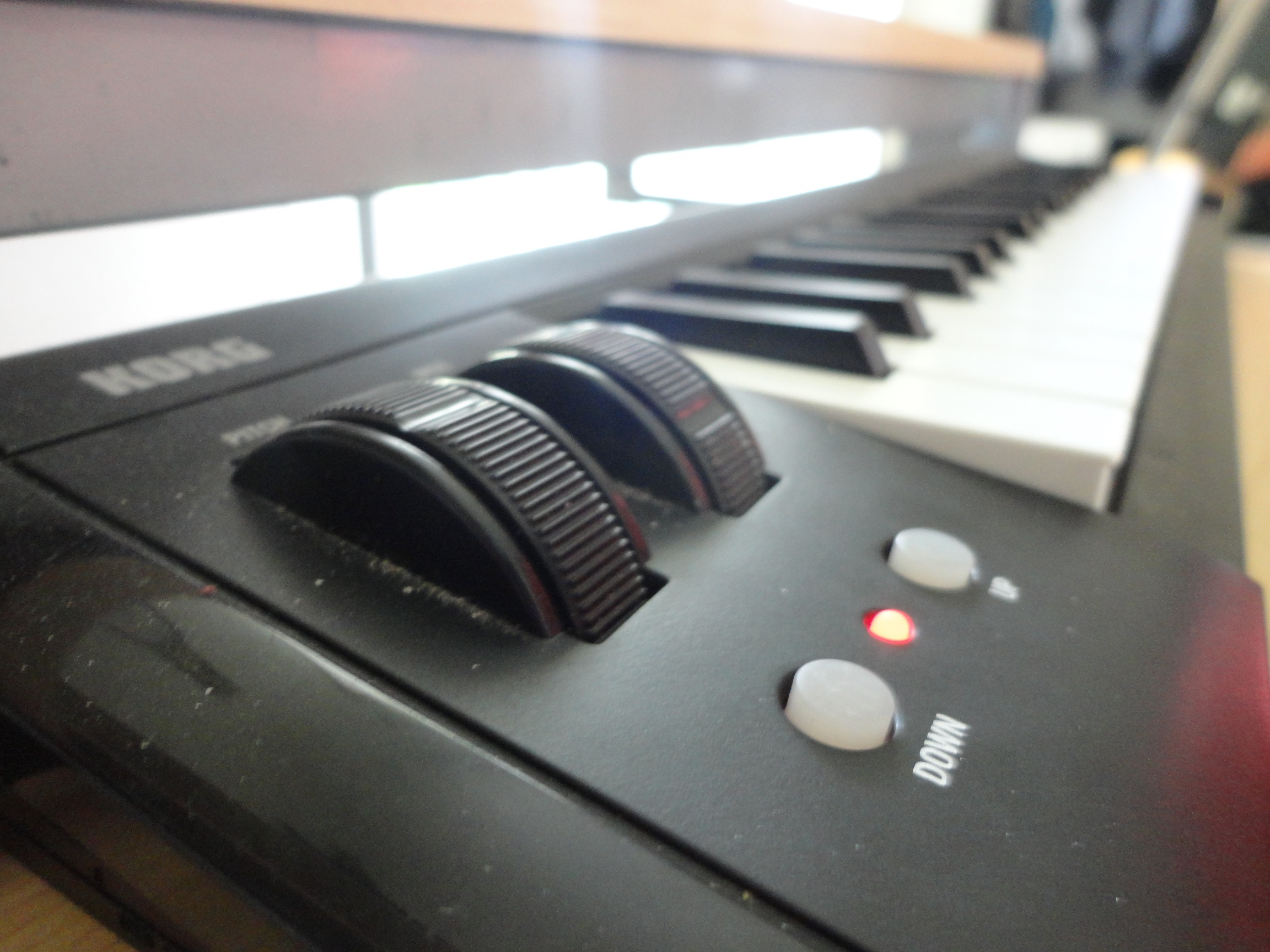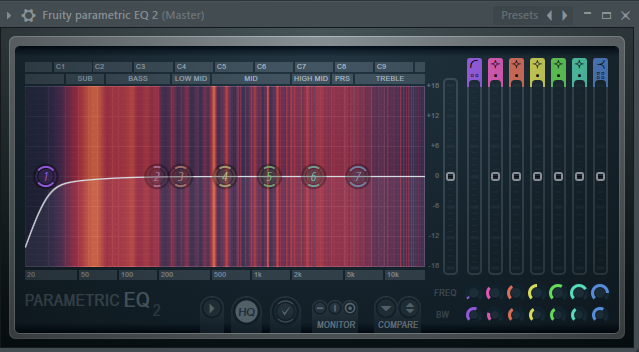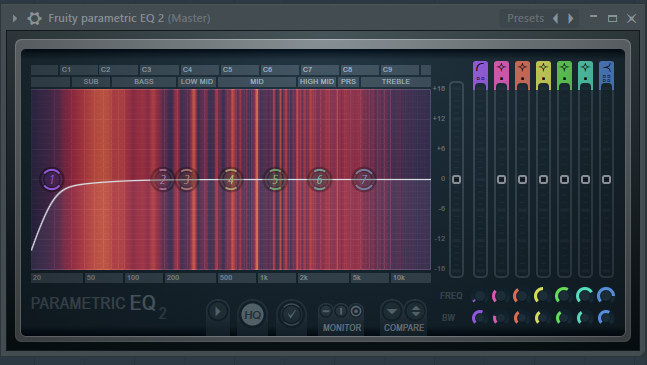-
Posts
6,165 -
Joined
-
Last visited
-
Days Won
53
Content Type
Profiles
Forums
8Tracks
Articles
Events
Blogs
Everything posted by timaeus222
-

1. work-in-progress Corridors of Time
timaeus222 replied to Jolly//Pls's topic in Post Your Game ReMixes!
I like the glassy stutter synth at the beginning. Good way to establish the atmosphere there. Also good development of textures to keep the groove from getting too stale. However, I would say the lead sound at 1:35 for example, is too thin. Compared to the bass, which is really meaty, the lead is just overpowered when it's playing melody. I would consider picking a different sound for the lead, one that has more body and expression. Lastly, I think the beginning maybe comes in with the claps too quickly (before 0:32), so that the intro doesn't really sound like it eases you into the track; it just starts. -

OCR04108 - Sonic & Knuckles "Volcanic Glass"
timaeus222 replied to Liontamer's topic in ReMix Reviews & Comments
A pleasant surprise! I like the 'desert' feel in the middle (2:02)! -

OCR04048 - Chrono Cross "Anti-Annihilation Matrix"
timaeus222 replied to Liontamer's topic in ReMix Reviews & Comments
I don't know why I haven't heard this. This is such a great contrast from your usual work, and I very much want to see you do more like this! I hear the overcompression, but it isn't at all a problem in the big picture. -

OCR04081 - Super Mario Bros. 2 "Birdo's Revenge"
timaeus222 replied to Liontamer's topic in ReMix Reviews & Comments
This is some cheeky stuff. Good to see that it set a new precedent as well, and wasn't just NOed and asked to be extended. -

OCR03790 - Mega Man X1 & X3 "Red Shifting Drift"
timaeus222 replied to Liontamer's topic in ReMix Reviews & Comments
Gario's always been a swell guy on the Workshop forums, and his contribution to this album is full of celebratory energy. The choir fills the soundscape pretty nicely, adding an uplifting textural bed to support the leads, and the brass and strings maintain the energy by accenting the leads. The stutter-crazy lead sequencing, though, is what really exemplifies his attention to detail when it comes to extracting expression and nuance out of generally lower-quality sounds. I don't know about his title though; I consider this track more of a blue shift to higher energy. #BadSpectroscopyJoke -

OCR03950 - Mega Man X5 & X1 "Firefly"
timaeus222 replied to Liontamer's topic in ReMix Reviews & Comments
I really like how Sir_NutS has a distinct flavor to his soundscapes; I can usually tell when something he makes is something he made---I get a 'signature sound' feel. This is one aggressive, bouncy, and balls-to-the-wall glitch hop track; Usa contributed some wicked solos, and NutS made it hardcore! This is something I definitely recommend for someone in the mood to rock out to this sick electronic playground! - Direct from my artist comments from when this was going to be on an album -

OCR04085 - Paper Mario "Teenage Mutant Ninja Koopa"
timaeus222 replied to Liontamer's topic in ReMix Reviews & Comments
A Sir J mix? Hell yeah! -

OCR04084 - Terranigma "Brave New World"
timaeus222 replied to Liontamer's topic in ReMix Reviews & Comments
I really like the harmonies here. Really tasteful stuff. Guitar was the highlight for me. I was gonna say it took on a Western sound later on, and then I see Wild Arms being mentioned, so it's not just me! -
There's just something about the guitar samples in this that filled out the atmosphere in a way that the synth guitars by themselves did not. I think that is an even greater improvement than before! The guitar soundscape is more full/meaty and less nasal, and overall the EQ is tamer in the upper treble as well. I honestly think this is ready to submit to see how it will go, as far as polishing it based on the intended vision. Just don't forget to cut out the many seconds of silence at the end.
-

OCR04065 - Elder Scrolls V: Skyrim "Dragonborn Concerto"
timaeus222 replied to Liontamer's topic in ReMix Reviews & Comments
Mazedude never fails to amaze me! Dhsu's piano actually fits in with the glitchy chip style, but sounds also mostly preserved from the original performance rather than being glitched to line up with the chip. 100% downloading this one. I disagree that it wasn't polished enough---it's possible to be too critical of yourself, and I think this was extremely polished. I also appreciate your more-than-two-cents. Your prose is still fun to read to this day. -
I think I remember having a hard time understanding the vocoded vocals, and maybe the very end could have trailed on for a little longer, but that aside... Tuberz did a great job on his lead vocals. The funk guitar riffs were a nice subtle touch, and the slap bass and drums playing off each other throughout helped keep this arrangement engaging!
-
There we go, I think you got it. Especially noticeable at 1:45, - 1:47, the guitar sounds less nasal and does have more presence, but as far as I can tell, you didn't accidentally put back the old bass clutter. You'd have to A/B it to notice the difference I think. Otherwise, you may want to ask someone like @Gario perhaps to take a look as well. I'm not sure though, he's last been here a month ago. Nonetheless, the main challenge I'd be concerned about is just that the "guitar" doesn't actually sound like a guitar, so as-is, it kinda has to function as a fake guitar while still suiting the overall soundscape. As far as comparing to posted mixes, this should be a good one to think about, since it's a pretty similar style. As it turns out, this guy did the mixing himself, I never actually mixed it for him interestingly enough. Another similar ReMix to compare to: The main things to focus on are: Are my drums present enough compared to the guitar/bass? Is there significant pumping on the overall mix when the kick and bass are slamming the limiter (2:55 - 4:12)? Is it fatiguing to listen to this?
-
It does sound a lot better! The drums have more presence, and there's not nearly as much overcompression as there was before. Even v3 still had a bit of that leftover. I will however say that the guitars don't sound as heavy, as they've lost some low end presence (40-60 Hz most importantly) compared to v3 (most noticeable at 2:55), while they do actually have a bit more presence above 10000 Hz after lifting some of that overcompression. What happened to the bass there? V3: V5:
-

OCR04030 - Skies of Arcadia "The Silver Crystal"
timaeus222 replied to Liontamer's topic in ReMix Reviews & Comments
This is the first of this jazzier side of Deedubs I've heard, but I like it! It's very impressive that you put this together in a few days. It sounds more like it actually took you a few weeks. -
Yeah, I think you should just use Shreddage then. I was guessing Shreddage because you own it. The synth sounds like it wants to be a guitar, and is playing the role of one. Might as well give that a go! Oh, you have sidechaining on almost all instruments? In a metal-sounding ReMix, it should just be between the kick and the bass, and really shouldn't be between anything else because the more you do it, the more pumping it creates (some sounding unintentional). Sidechaining is really just to help the kick come through because it conflicts with the bass's frequencies. Even in more typical EDM, you'd mainly hear subtle sidechaining between kick and bass so the kick can come through, and otherwise, kick and pads for noticeable pumping effects. The kick missing low end is the one that sounds more acoustic, so yeah, the one you're sequencing like a drum kit kick.
-
Happy new year! Gonna take a listen. My first impression is that the arrangement is really solid. There isn't really much I would change in terms of the notes written or the structure. The mixing is definitely where I would take another look. Some mixing references I would be comparing this to: https://www.youtube.com/watch?v=EAjIbPJ_dt0 (overall) https://soundcloud.com/isworks/shreddage-2-some-other-song-by (the kick doesn't have to be as strong as here though) What comes to mind: Minor nitpick, maybe the bit reduction went a tad far around 1:36. Not a big deal, but I thought I'd mention it, slightly bothers me because in general it generates harsh upper frequencies. I'm guessing you're actually using Shreddage, but (like at 1:48) the guitar seems to be very thin, lacking frequencies below around 300 Hz (to the point where it sounds like FL Slayer?). Also, it appears to be sequenced with fairly unchanging, high velocities so that you're mainly getting the hammer-ons/pull-offs instead of palm mutes. I get that it's playing fast, but it's sounding more like a distorted electronic arpeggio than an actual electric guitar. At the very least, I would not high pass the guitar nearly that much (if you are), and I would also try using MIDI CC automation to turn on Tapping Mode so that it's hopefully more smooth playing that fast. The kick drum is clicky enough, but I'm missing that low end thump (around 40~80 Hz). Try layering on another kick sample that has those frequencies. (I'd recommend using the Layer tool for that.) If you're worried about the kick clashing with the bass, that's where sidechaining comes in. I think you know how to do that, but in this case just a little bit is fine, just so that the kick and bass can play at the same time but the kick still can be fully heard. (Maybe you're already doing it, if it's as subtle as I'm suggesting.) At 2:57 - 4:14, you have a very busy, cluttered soundscape, definitely overcompressed. I think compared to version 1, you did improve this aspect, but the issue still remains. As far as the instruments go, the bass, guitar, and kick drum interaction with the Limiter is the main culprit. The default Fruity Limiter, if that's what you're using, is hard to work with if you want to write music where you could end up with a waveform sausage. I think you have two major options. 1. If you want to keep using it, I'd recommend lowering the Release a bit so that the compression doesn't stay too long, and maybe raising the Ceiling a bit so that you aren't running into overcompression as much. In this case, consider checking the sidechaining of the kick with the bass to adjust for this change in the Limiter settings. 2. Or... I don't know how much this will make you go back to check the mixing, but I've been using TLs-Pocket Limiter for years, and it's a free soft-knee limiter which has not given me any overcompression issues since I first used it back in 2012-2013. You would have to be careful about clipping, but it will let you basically hear what you give it at face value. I think that about covers it. The guitar is missing low end frequencies, and has fairly unchanging, high velocities, making it sound more electronic than electric (if that makes sense), and would benefit from Tapping Mode over just playing the notes without prior UI tweaks, just so it has smoother note transitions. The kick is also missing low end thump. And then at 2:57 - 4:14 the soundscape is super cluttered because of the kick and bass competing. The arrangement itself sounds good to me, and I'm behind that. End of Mod Review
-
You mark it how you want... but I'll give my remarks now that winter break is here and I'm at home with my proper headphones. Looking back up at Rozovian's review earlier, I have to say, I still hear what he heard way back then. - There are some weird volume jumps, sometimes rhythmic skips, and sometimes just sharp cutoffs to the starts or the ends of notes (which cut off important transients that actually represent someone placing the finger on the piano key). Some of these are at 0:00, 1:27, 1:31, 3:02, 3:05, 3:10, 3:32, and 3:38 (subtle), to name a few. The one at 3:38 was like a compressor was being applied to the note. - Some melodic runs also sound too detached (not overlapping enough), such as 2:38 - 2:47 (among others), while also having too-similar, and high, velocities. As a result, those runs still lack realism. - Something else he maybe didn't point out was that the panning felt a bit odd to me from a first impression. I've never really heard a piano so wide before (it's like I'm sticking my head right above middle C). If you want to continue with this, you may want to see if you can have some sheet music put together for someone to perform. You seem to have been at this for a long time, as revision(s) have still left more or less the same issues that were spotted about 8 months ago. Hope this pushes you forward in a good direction somehow.
-

OCR04005 - Chrono Cross "Trust My Unwavering Heart"
timaeus222 replied to Liontamer's topic in ReMix Reviews & Comments
This felt like a pretty large undertaking, and I was just on the mixing and mastering end of things. Great job everyone! -

OCR03993 - Skies of Arcadia "God's Ambition"
timaeus222 replied to Liontamer's topic in ReMix Reviews & Comments
This is absolutely phenomenal. I have no other words. -

Different sound in different situations, help!:)
timaeus222 replied to Audiomancer's topic in Music Composition & Production
I'm not sure which version of Windows you're using, but I'd try checking your Speakers properties (click the Speaker icon on the taskbar, then click the Speaker if Windows 7, for example. Then click the Enhancements tab and click Disable all enhancements). That's what comes to mind for me.





